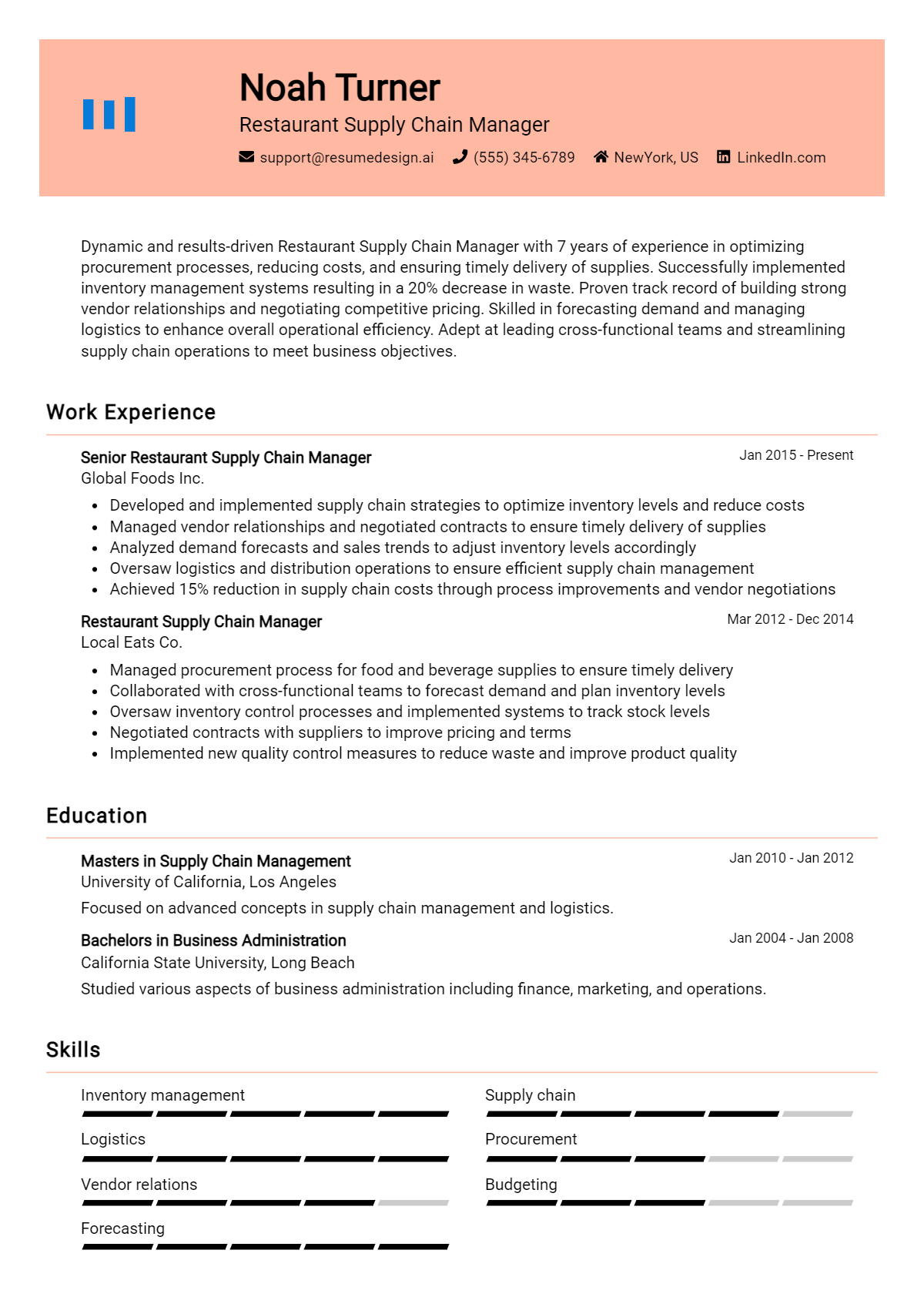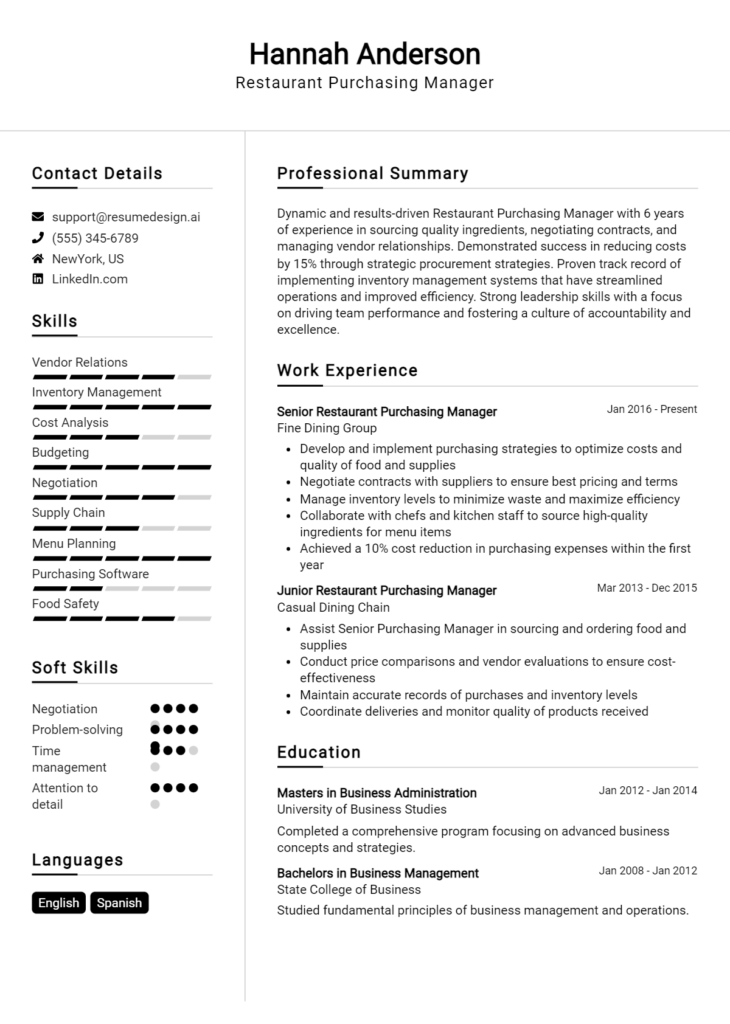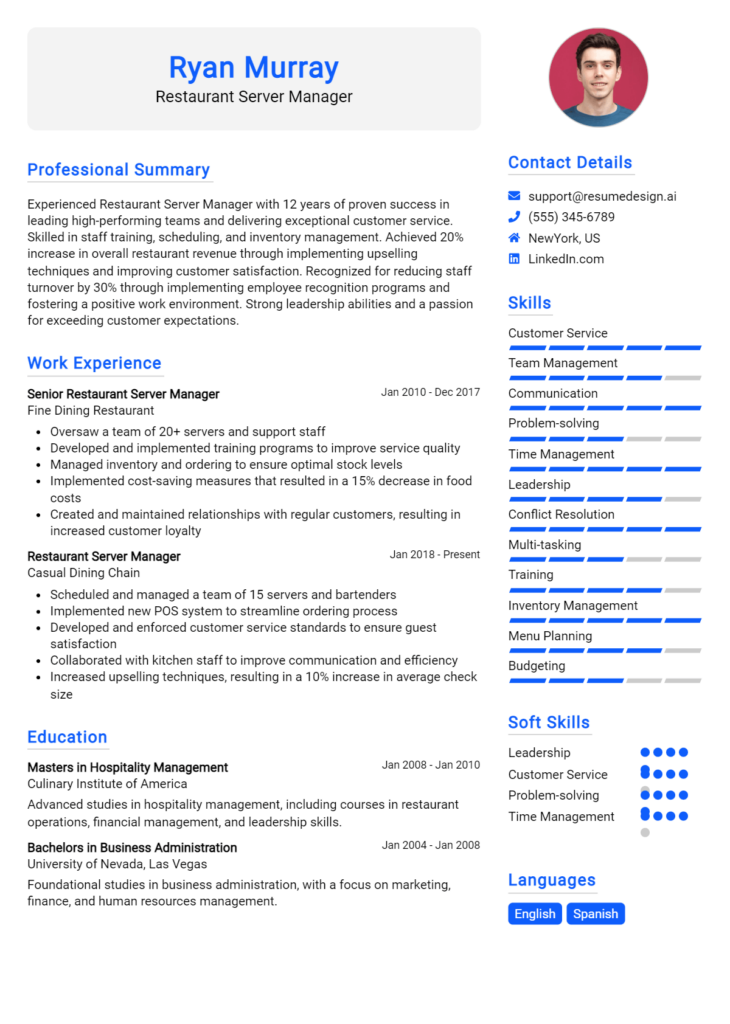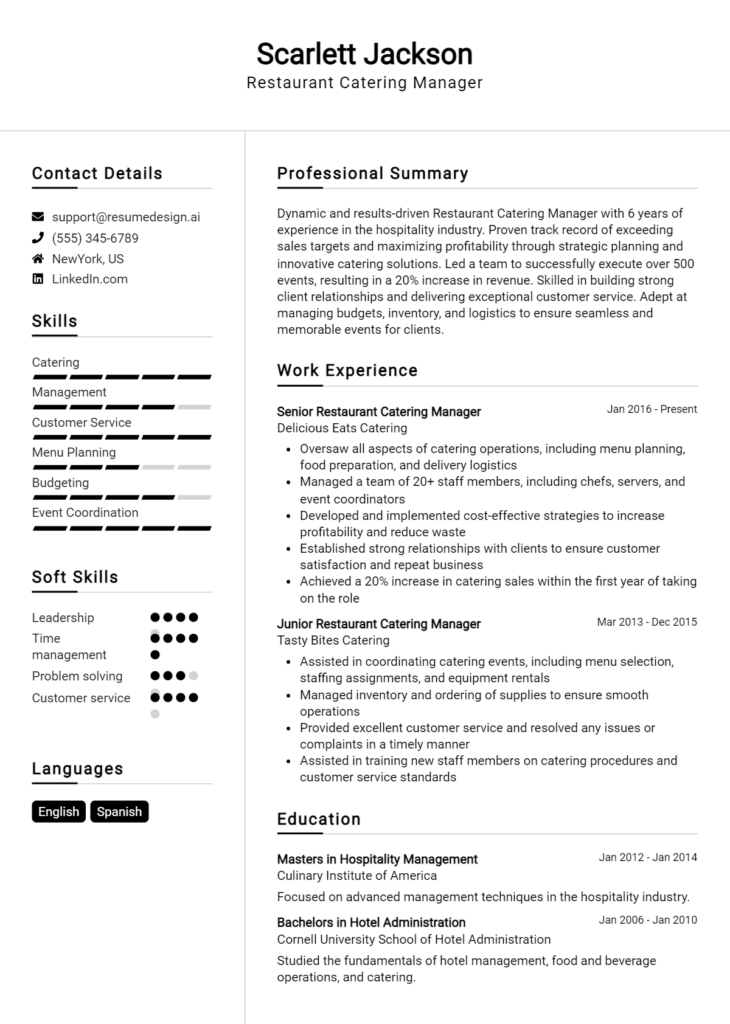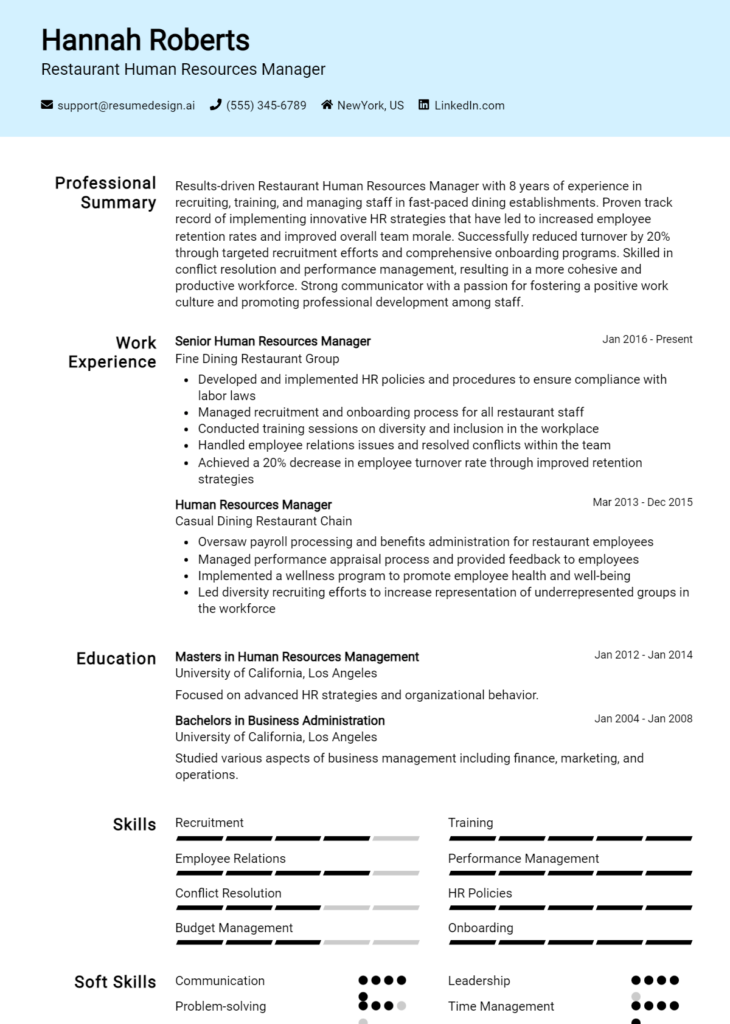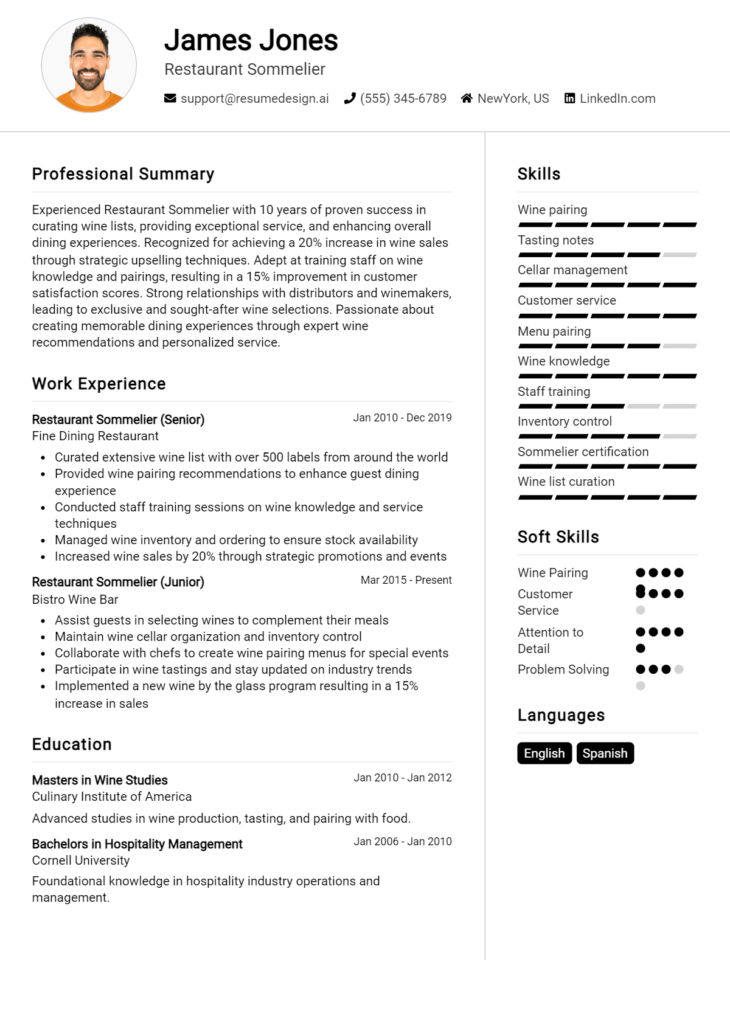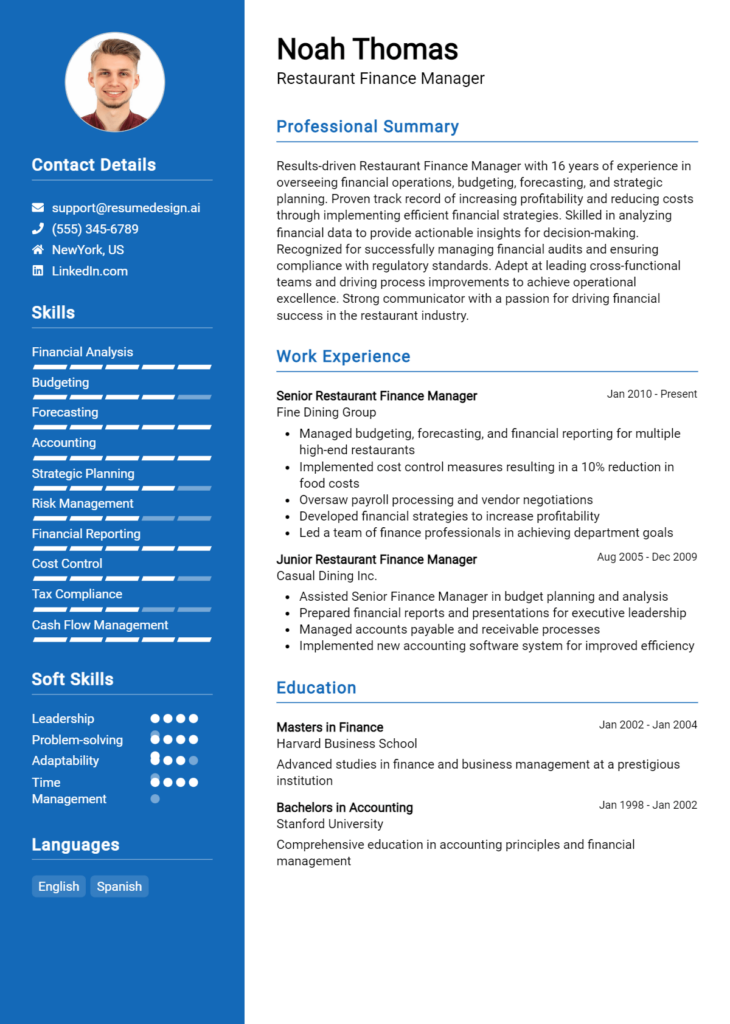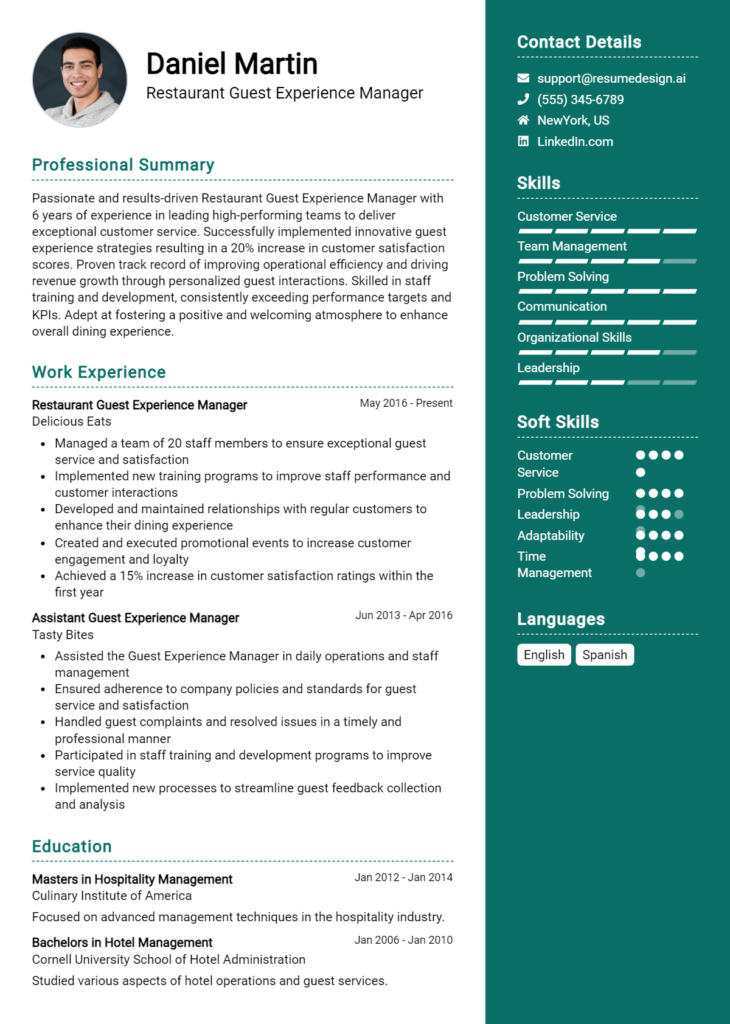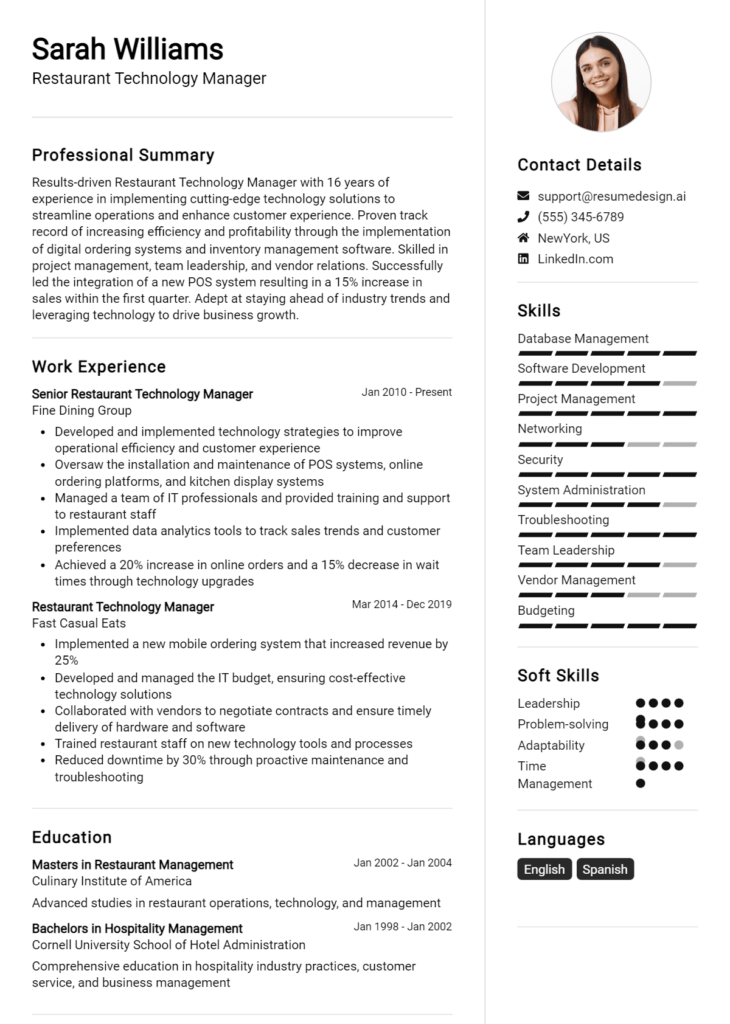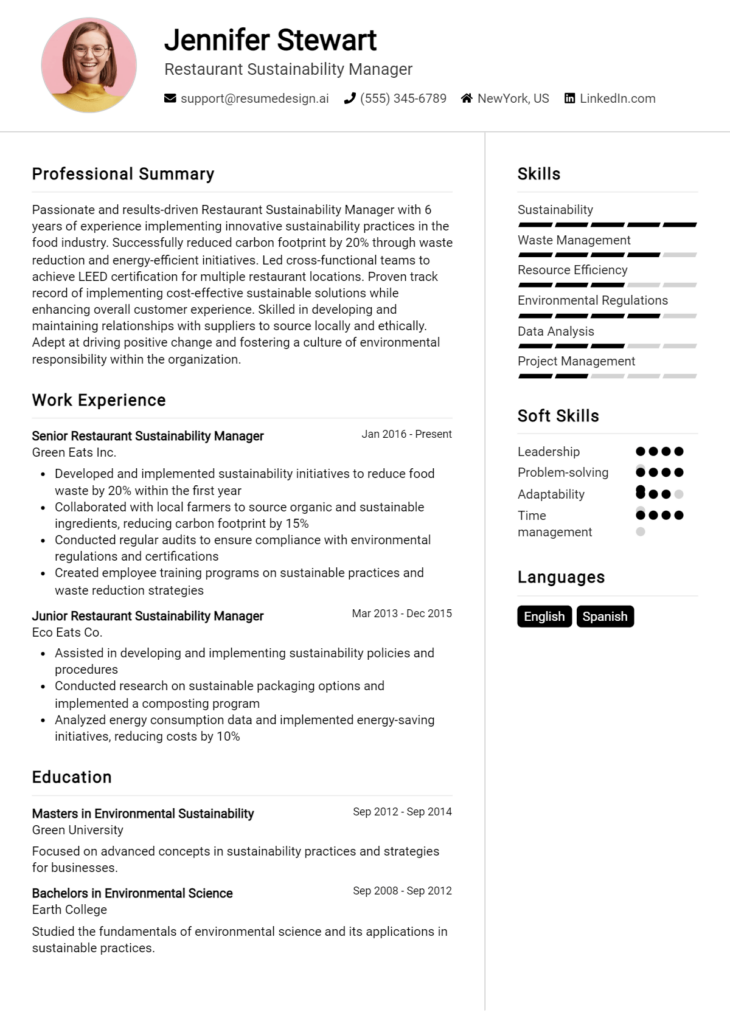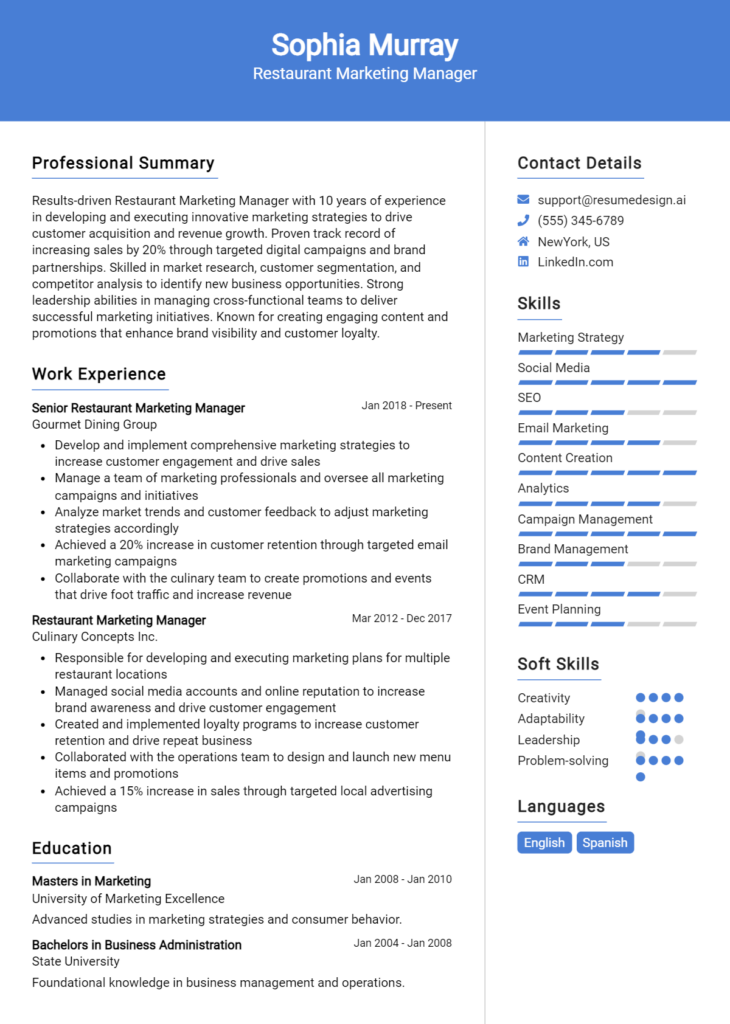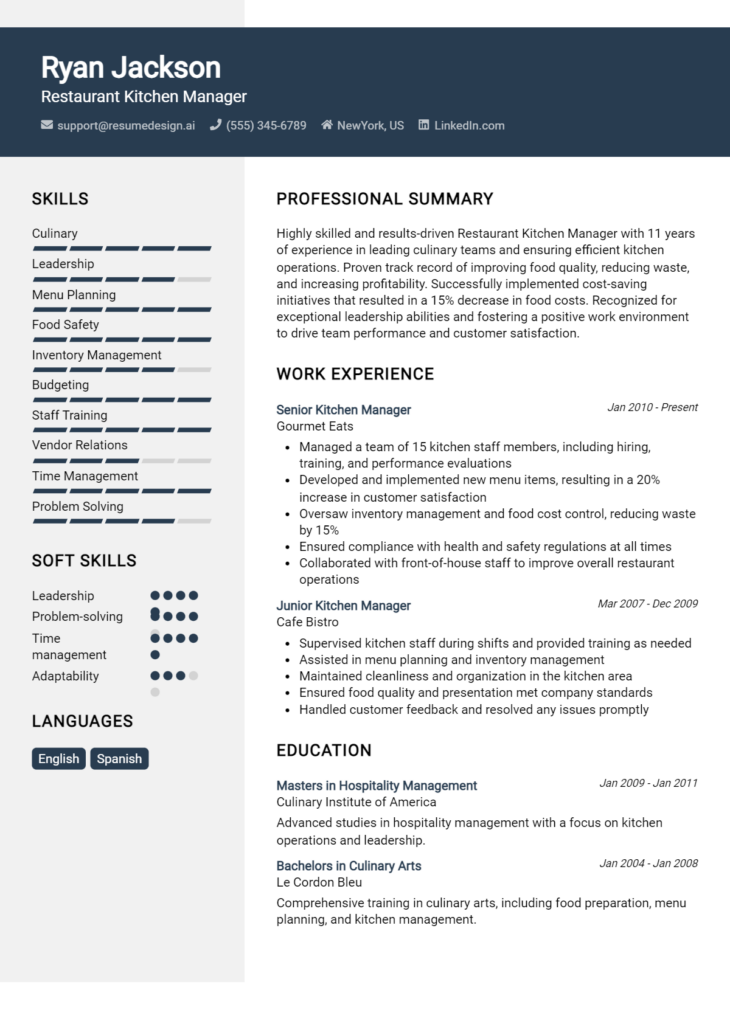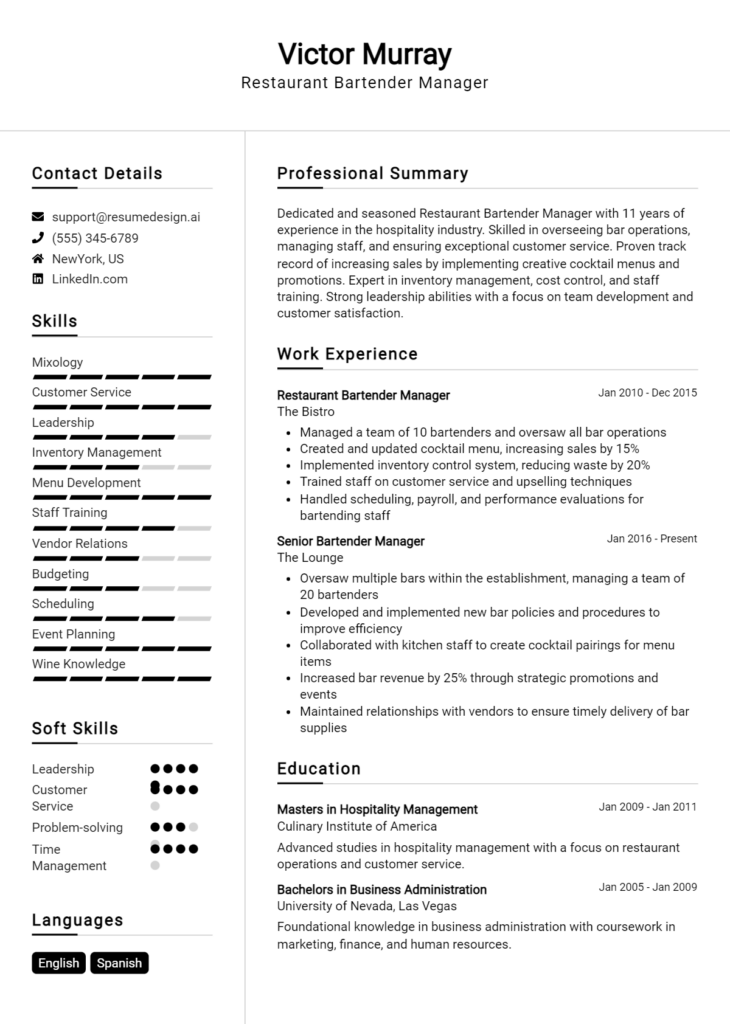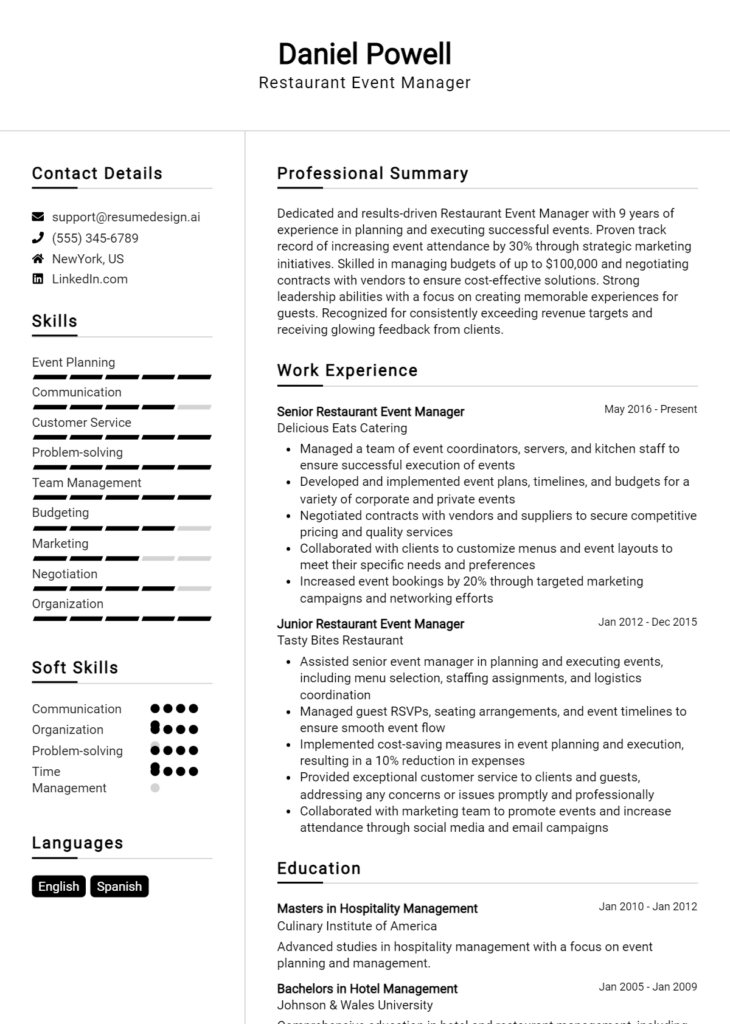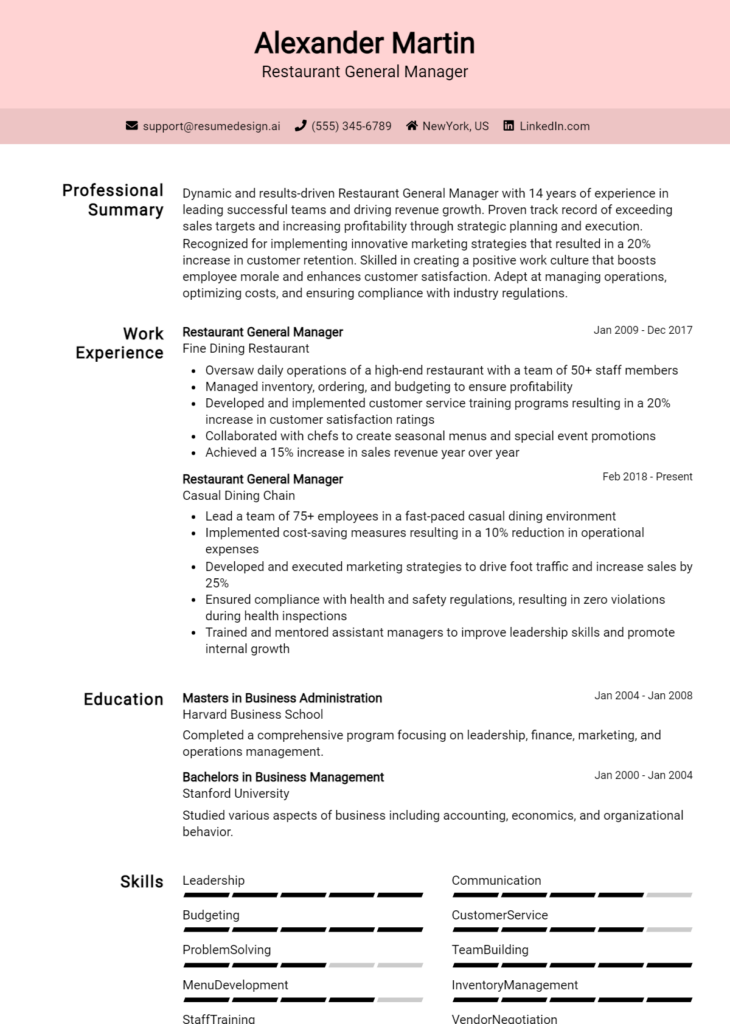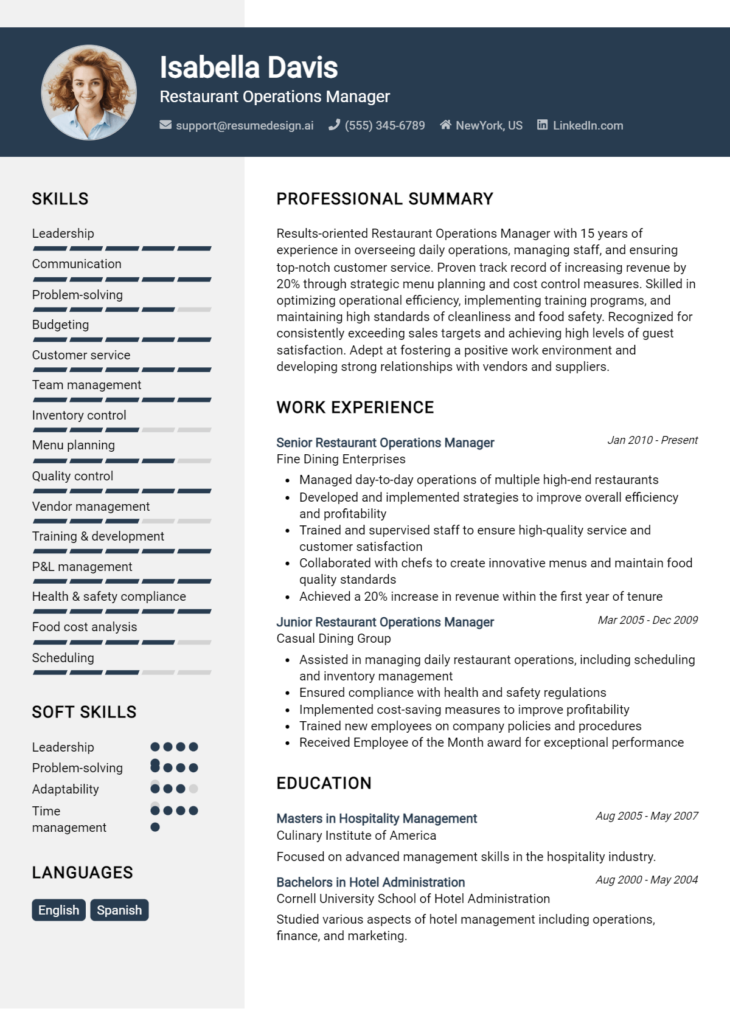Restaurant Supply Chain Manager Core Responsibilities
A Restaurant Supply Chain Manager plays a crucial role in ensuring the seamless flow of goods and services between various departments, including procurement, inventory management, and operations. Key responsibilities include managing supplier relationships, optimizing inventory levels, and forecasting demand to minimize waste. Essential skills for success in this role encompass technical acumen, operational efficiency, and strong problem-solving abilities. These competencies not only contribute to the organization's efficiency but also enhance overall profitability. A well-structured resume can effectively showcase these qualifications, demonstrating the candidate's ability to bridge functions and drive results.
Common Responsibilities Listed on Restaurant Supply Chain Manager Resume
- Develop and implement supply chain strategies to optimize operations.
- Manage supplier relationships and negotiate contracts for cost-effective procurement.
- Monitor inventory levels and establish reorder points to prevent shortages.
- Analyze market trends and demand forecasts to adjust procurement plans.
- Coordinate with kitchen staff to ensure timely delivery of fresh ingredients.
- Implement inventory management systems to enhance tracking and reporting.
- Conduct regular audits of supply chain processes for efficiency improvements.
- Collaborate with finance to manage budgets and control costs.
- Train and mentor staff on supply chain best practices.
- Address and resolve supply chain disruptions promptly.
- Utilize data analytics to inform decision-making and enhance performance.
- Ensure compliance with health and safety regulations in procurement processes.
High-Level Resume Tips for Restaurant Supply Chain Manager Professionals
In the competitive landscape of the restaurant industry, a well-crafted resume is crucial for professionals aspiring to become Restaurant Supply Chain Managers. This document often serves as the first impression a candidate makes on a potential employer, making it essential that it effectively showcases not just skills, but also key achievements in the field. A strong resume can open doors to interviews and ultimately, job offers. This guide will provide practical and actionable resume tips specifically tailored for Restaurant Supply Chain Manager professionals, equipping you with the tools to stand out in a crowded job market.
Top Resume Tips for Restaurant Supply Chain Manager Professionals
- Tailor your resume to the job description by using relevant keywords and phrases that align with the specific requirements of the position.
- Highlight your relevant experience in supply chain management, focusing on your roles in the restaurant industry or related fields.
- Quantify your achievements with metrics, such as cost savings, efficiency improvements, or inventory reductions, to demonstrate your impact.
- Showcase your proficiency with industry-specific tools and technologies, such as inventory management software or vendor relationship management systems.
- Include certifications that are relevant to supply chain management and the restaurant industry, such as APICS or CSCP certifications.
- Emphasize your skills in negotiation and vendor management, as these are crucial for optimizing the supply chain in a restaurant setting.
- Incorporate soft skills that are vital for the role, such as problem-solving, communication, and leadership abilities.
- Use a clean and professional format that is easy to read, ensuring that your most important information stands out.
- Include a summary statement at the top of your resume that captures your career goals and highlights your strengths as a supply chain manager.
By implementing these tips, you can significantly increase your chances of landing a job in the Restaurant Supply Chain Manager field. A well-structured and targeted resume will not only showcase your qualifications but also demonstrate your commitment to excelling in this vital role within the restaurant industry.
Why Resume Headlines & Titles are Important for Restaurant Supply Chain Manager
In the competitive landscape of the restaurant industry, the role of a Restaurant Supply Chain Manager is crucial for ensuring that operations run smoothly and efficiently. A well-crafted resume headline or title serves as the first impression for hiring managers, encapsulating a candidate's key qualifications in a succinct and impactful manner. This immediate grab of attention can set the tone for the rest of the resume, highlighting relevant skills, experiences, and accomplishments that align with the job requirements. A strong headline should be concise, relevant, and directly related to the position being applied for, making it an essential element in the job application process.
Best Practices for Crafting Resume Headlines for Restaurant Supply Chain Manager
- Keep it concise; aim for one impactful phrase.
- Make it role-specific by including keywords from the job description.
- Highlight your most impressive accomplishments or skills.
- Avoid jargon and overly complex language; clarity is key.
- Use active language to convey a sense of dynamism and capability.
- Tailor your headline for each application to reflect the specific role.
- Include quantifiable achievements when possible for added impact.
- Stay professional and avoid clichés that can dilute your message.
Example Resume Headlines for Restaurant Supply Chain Manager
Strong Resume Headlines
"Results-Driven Restaurant Supply Chain Manager with 10+ Years of Experience in Cost Reduction and Efficiency Optimization"
"Strategic Supply Chain Expert Specializing in Sustainable Sourcing and Inventory Management"
“Dynamic Leader with Proven Track Record in Streamlining Operations and Enhancing Supplier Relationships”
Weak Resume Headlines
“Supply Chain Manager”
“Experienced Professional Seeking Opportunities”
The strong resume headlines are effective because they immediately communicate key strengths and specific areas of expertise relevant to the Restaurant Supply Chain Manager role. They utilize impactful language and quantifiable achievements that resonate with hiring managers. In contrast, the weak headlines lack specificity and fail to convey the candidate's unique qualifications, making them easily overlooked in a sea of applications. A compelling headline can be the difference between catching a hiring manager's eye and being dismissed as just another generic resume.
Writing an Exceptional Restaurant Supply Chain Manager Resume Summary
A resume summary is a crucial component for a Restaurant Supply Chain Manager, as it serves as the first impression a candidate makes on hiring managers. A strong summary quickly captures attention by succinctly showcasing key skills, relevant experience, and notable accomplishments pertinent to the role. It sets the tone for the rest of the resume and provides a snapshot of the candidate's professional identity. An impactful summary should be concise, tailored to the specific job description, and highlight what makes the candidate uniquely qualified for the position.
Best Practices for Writing a Restaurant Supply Chain Manager Resume Summary
- Quantify Achievements: Use numbers and percentages to demonstrate your impact.
- Focus on Relevant Skills: Highlight skills that are directly applicable to supply chain management in the restaurant industry.
- Customize for Each Job: Tailor your summary to reflect the specific requirements and keywords from the job description.
- Be Concise: Keep your summary brief, ideally 2-4 sentences, to maintain the hiring manager's attention.
- Showcase Leadership: Emphasize any leadership roles or initiatives you've led that improved operations.
- Highlight Industry Knowledge: Mention familiarity with industry trends, regulations, or technologies.
- Use Action-Oriented Language: Start sentences with strong action verbs to convey confidence and proactivity.
- Include Certifications: If applicable, mention any relevant certifications that enhance your qualifications.
Example Restaurant Supply Chain Manager Resume Summaries
Strong Resume Summaries
Results-driven Restaurant Supply Chain Manager with over 7 years of experience improving procurement processes, achieving a 20% reduction in costs while maintaining quality standards. Expertise in vendor negotiations and inventory management, leading to a 30% decrease in waste through efficient inventory control systems.
Dynamic Supply Chain professional with a proven track record of optimizing supply chain processes in fast-paced restaurant environments. Successfully implemented a new vendor management strategy that reduced lead times by 15%, enhancing overall service delivery and customer satisfaction.
Innovative Restaurant Supply Chain Manager with a focus on sustainability and cost-effectiveness. Spearheaded a project that integrated eco-friendly suppliers, resulting in a 25% decrease in carbon footprint and a 10% cost savings in the supply chain budget.
Weak Resume Summaries
Experienced in supply chain management and restaurant operations.
A detail-oriented professional looking to leverage skills in a new supply chain role.
The examples above illustrate the difference between strong and weak resume summaries. Strong summaries are effective because they provide specific, quantifiable achievements and directly relate to the responsibilities of a Restaurant Supply Chain Manager. In contrast, weak summaries are vague and lack detailed information, making it challenging for hiring managers to gauge the candidate's qualifications or the impact they could bring to the role.
Work Experience Section for Restaurant Supply Chain Manager Resume
The work experience section of a Restaurant Supply Chain Manager resume is crucial for demonstrating a candidate's technical skills, leadership capabilities, and effectiveness in delivering high-quality products. This section not only outlines previous roles and responsibilities but also highlights how the candidate has successfully managed supply chain processes, coordinated with various teams, and achieved measurable results. By quantifying achievements and aligning experiences with industry standards, candidates can effectively convey their expertise and value to potential employers, making this section a pivotal component of the resume.
Best Practices for Restaurant Supply Chain Manager Work Experience
- Use specific metrics to quantify achievements, such as cost savings, efficiency improvements, and delivery timelines.
- Highlight technical skills relevant to supply chain management, such as inventory management software and forecasting tools.
- Demonstrate leadership by showcasing team management experiences and collaborative projects.
- Align work experience descriptions with industry standards and terminology to resonate with hiring managers.
- Focus on results-oriented statements that illustrate successful outcomes and contributions to business goals.
- Incorporate keywords from the job description to optimize the resume for applicant tracking systems (ATS).
- Provide context for your achievements by describing the challenges faced and the strategies implemented to overcome them.
- Keep descriptions concise and impactful, ensuring each bullet point adds value to your narrative.
Example Work Experiences for Restaurant Supply Chain Manager
Strong Experiences
- Led a cross-functional team to implement a new inventory management system, resulting in a 20% reduction in food waste and a 15% decrease in supply costs over one year.
- Negotiated contracts with suppliers that reduced material costs by $150,000 annually, while maintaining quality standards across all product lines.
- Developed and executed a streamlined logistics plan that improved delivery times by 30%, enhancing customer satisfaction and operational efficiency.
- Trained and mentored a team of 10 supply chain professionals, fostering collaboration and improving team performance, which increased productivity by 25%.
Weak Experiences
- Managed supply chain operations.
- Worked with vendors to purchase supplies.
- Helped improve processes in the warehouse.
- Oversaw inventory levels for the restaurant.
The examples presented highlight the distinction between strong and weak experiences. Strong experiences are characterized by specific, quantifiable outcomes and demonstrate technical expertise and leadership in managing supply chain operations. They provide clear evidence of the candidate's impact on the organization. In contrast, weak experiences lack detail and measurable accomplishments, making them less compelling and failing to convey the candidate's contributions effectively. This emphasizes the importance of crafting impactful statements that reflect true achievements and skills.
Education and Certifications Section for Restaurant Supply Chain Manager Resume
The education and certifications section of a Restaurant Supply Chain Manager resume is crucial as it showcases the candidate's academic background and professional qualifications that are pertinent to the role. This section not only reflects the foundational knowledge acquired through formal education but also emphasizes the candidate's commitment to continuous learning and professional development through industry-relevant certifications. By providing information on relevant coursework, specialized training, and certifications, candidates can significantly enhance their credibility and demonstrate a strong alignment with the demands of the job, making them more appealing to potential employers.
Best Practices for Restaurant Supply Chain Manager Education and Certifications
- Include degrees from accredited institutions relevant to supply chain management, logistics, or food service.
- Highlight industry-recognized certifications such as Certified Supply Chain Professional (CSCP) or Certified in Production and Inventory Management (CPIM).
- Provide detailed descriptions of relevant coursework that directly applies to supply chain processes in the restaurant industry.
- List any specialized training programs or workshops attended that focus on food safety, inventory management, or vendor relations.
- Keep the section concise but informative, ensuring that all entries are relevant to the restaurant supply chain context.
- Use bullet points for clarity and organization, making it easy for hiring managers to scan through qualifications.
- Update the section regularly to reflect any new certifications or educational achievements.
- Consider including GPA or honors if they are particularly impressive and relevant to the role.
Example Education and Certifications for Restaurant Supply Chain Manager
Strong Examples
- Bachelor of Science in Supply Chain Management, University of Food Science, 2020
- Certified Supply Chain Professional (CSCP), APICS, 2021
- Food Safety Management Certification, ServSafe, 2022
- Coursework: Logistics Management, Inventory Control, and Procurement Strategies
Weak Examples
- Associate Degree in General Studies, Community College, 2018
- Certification in Basic Culinary Skills, 2019
- High School Diploma, 2015
- Online Course: Introduction to Supply Chain, 2020 (not recognized by industry)
The examples provided illustrate a stark contrast between strong and weak qualifications. Strong examples demonstrate relevant degrees and certifications that are recognized in the industry, showcasing a clear commitment to the field of restaurant supply chain management. In contrast, weak examples reflect qualifications that lack relevance, are outdated, or do not align with the skills and knowledge required for the role. This distinction emphasizes the importance of tailoring educational backgrounds and certifications to meet the expectations of potential employers within the industry.
Top Skills & Keywords for Restaurant Supply Chain Manager Resume
A Restaurant Supply Chain Manager plays a critical role in ensuring that a restaurant operates smoothly and efficiently. The effectiveness of this position often hinges on a well-crafted resume that highlights both hard and soft skills. Employers seek candidates who not only understand the complexities of supply chain management but also possess the interpersonal skills necessary to navigate the dynamic environment of the food industry. By showcasing relevant skills, candidates can demonstrate their ability to enhance operational efficiency, manage vendor relationships, and contribute to overall business success. Analyzing and tailoring your resume with the right skills can significantly improve your chances of landing a job in this competitive field.
Top Hard & Soft Skills for Restaurant Supply Chain Manager
Soft Skills
- Communication
- Problem-Solving
- Leadership
- Negotiation
- Time Management
- Team Collaboration
- Adaptability
- Customer Service Orientation
- Critical Thinking
- Conflict Resolution
Hard Skills
- Inventory Management
- Procurement Strategies
- Supply Chain Optimization
- Cost Analysis
- Vendor Relationship Management
- Data Analysis
- Logistics Coordination
- Forecasting and Demand Planning
- Quality Control
- Regulatory Compliance
By including these essential skills and emphasizing relevant work experience, you can create a compelling resume that speaks to your capabilities as a Restaurant Supply Chain Manager.
Stand Out with a Winning Restaurant Supply Chain Manager Cover Letter
I am excited to apply for the Restaurant Supply Chain Manager position at your esteemed establishment, as advertised. With over five years of experience in supply chain management within the food service industry, I have developed a comprehensive understanding of procurement, inventory management, and logistics that I believe would greatly benefit your operations. My ability to analyze market trends and negotiate favorable terms with suppliers has consistently resulted in cost reductions and improved service delivery.
In my previous role at XYZ Restaurants, I successfully streamlined the supply chain processes, reducing lead times by 25% and achieving a 15% decrease in overall supply costs. By implementing an innovative inventory management system, I was able to enhance product tracking and minimize food waste, ensuring that we maintained the highest quality standards while maximizing profitability. My strong analytical skills, combined with my attention to detail, allow me to identify inefficiencies and implement solutions that drive operational excellence.
Collaboration is key in the restaurant industry, and I pride myself on my ability to build strong relationships with suppliers, team members, and cross-functional departments. I am adept at fostering a culture of communication and teamwork, which has proven essential in meeting the fast-paced demands of the restaurant environment. I am enthusiastic about the opportunity to bring my strategic thinking and leadership skills to your team, helping to create an efficient and resilient supply chain that supports your restaurant's growth and success.
I am eager to discuss how my experience and vision align with the goals of your organization. Thank you for considering my application. I look forward to the opportunity to contribute my expertise in supply chain management to your restaurant and help drive its continued success.
Common Mistakes to Avoid in a Restaurant Supply Chain Manager Resume
When applying for the position of a Restaurant Supply Chain Manager, your resume serves as a critical tool to showcase your skills and experience. However, many applicants make common mistakes that can diminish their chances of making a positive impression. Avoiding these pitfalls can significantly enhance your resume and help you stand out in a competitive job market. Here are some frequent errors to steer clear of:
Generic Objective Statements: Using a vague or one-size-fits-all objective can make your resume blend in with others. Tailor your objective to reflect your specific goals and how they align with the restaurant’s needs.
Lack of Quantifiable Achievements: Failing to include metrics or specific achievements can weaken your impact. Use numbers to highlight your success, such as cost reductions, inventory turnover rates, or supplier negotiation savings.
Ignoring Relevant Skills: Overlooking essential skills pertinent to the role, such as logistics management, vendor relations, and inventory control, can make your resume less compelling. Be sure to emphasize skills that are directly applicable to supply chain management in the restaurant industry.
Overly Complex Language: Using jargon or overly technical terms can alienate hiring managers who may not be familiar with industry-specific terminology. Keep your language clear and concise to ensure your points are easily understood.
Inconsistent Formatting: A cluttered or inconsistent format can distract from the content of your resume. Use a clean, professional layout with uniform fonts and spacing to improve readability.
Not Customizing for Each Application: Sending out the same resume for every job application can lead to missed opportunities. Tailor your resume for each position to highlight the most relevant experience and skills.
Neglecting Soft Skills: Focusing solely on technical skills can overlook the importance of soft skills such as communication, teamwork, and problem-solving. Be sure to include these attributes, as they are vital in a collaborative restaurant environment.
Failing to Proofread: Typos and grammatical errors can create an unprofessional impression. Always proofread your resume or have someone else review it to catch any mistakes before submission.
Conclusion
As a Restaurant Supply Chain Manager, your role is pivotal in ensuring the smooth operation of the restaurant's supply chain, from sourcing ingredients to managing inventory and ensuring timely deliveries. Throughout this article, we covered various aspects that highlight the importance of this position, including the need for strong negotiation skills, the ability to analyze data for decision-making, and the necessity of maintaining relationships with suppliers.
We also discussed the significance of sustainability in sourcing and how embracing technology can enhance the efficiency of the supply chain. Understanding market trends and consumer preferences is crucial for making informed decisions that benefit both the restaurant and its patrons.
In conclusion, if you are looking to advance your career as a Restaurant Supply Chain Manager, it's essential to have a polished resume that reflects your skills and experiences. We encourage you to review your resume and consider utilizing various tools available to help you stand out in the competitive job market. Explore resume templates, create a professional document with our resume builder, check out resume examples for inspiration, and don't forget to craft an impressive cover letter using our cover letter templates. Taking these steps can significantly enhance your chances of landing your desired position.

